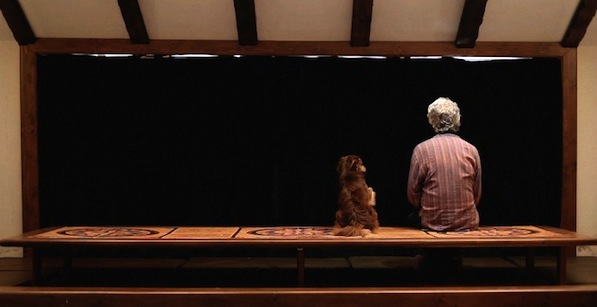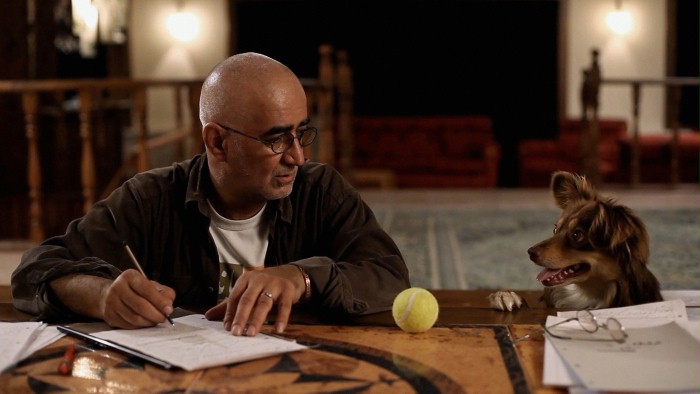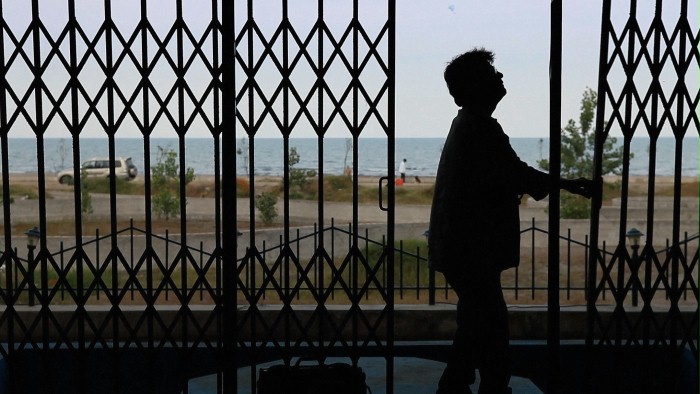Kambuzia Partovi came alone to Berlin, where Closed Curtain had its world premiere. His co-director, Jafar Panahi, couldn’t make it, as he’s been held in house arrest. After years of struggle and conflict with the Iranian government he (along with his family and twenty-plus friends) was arrested, charged with hostile propaganda and sentenced to a six-year jail sentence, a twenty-year ban on making films or speaking to the media, both domestic and international. His widely discussed, auto-thematic This Is Not a Film was made during his appeal. The film screened at the 2011 Cannes Film Festival, where it got on a flash-drive smuggled out of Iran in a cake. Closed Curtain (Pardé) brought Panahi Berlin’s Silver Bear for Best Script. (And it plays the final weekend of in-progress-festival TIFF.)
On the day of the screening many protesters gathered in front of the Berlinale Palast to manifest their disapproval of Iranian politics and its government’s infringement of free speech and artistic freedom. Therefore, the interview with Partovi, a creator but also, naturally, a voice for imprisoned Panahi, had to be political.
Keyframe: Mr. Panahi is imprisoned in his own house, Bahman Ghobadi is currently in Turkey, so many others who are in exile. We constantly hear about Iranian filmmakers being arrested….
What is the situation of directors in Iran now?
Kambozya Partovi: Everyone has to decide for himself how to proceed, within the development of their own movie and considering the circumstances. There are a lot of filmmakers who, at a certain point, decide to leave the country or do something else, even changing the profession or coping somehow with their situation. But I think the majority of the filmmakers in Iran prefer to at least try and stay there, figure out ways and means to find a way to express themselves through films and keep on making them. Sometimes it is really difficult and sometimes easier to deal with the environment when preparing for the upcoming project, to prepare the environment for it. Do you know Rakhshān Bani-E’temād, one of the famous Iranian filmmakers? She’s to me the best Iranian filmmaker. She lives in Iran despite having all the opportunities to go to USA or elsewhere: she prefers to stay. For her last project, a feature film she’s finished recently, which is really beautiful, she would recognize and realize the difficulties she was about to face, but she decided to continue working in Iran. Because she prefers to stay and find her own way to make it work than permanently leaving the country.
Keyframe: This is a rather general answer. Is it actually possible to stay and work?
Partovi: If you’re smart you can maybe find a way. Look at us. Me and Mr. Panahi somehow found a way to make a film.
Keyframe: But in hiding and under the threat of terrible repercussions… On a certain level the current situation of filmmakers in Iran reminds me of what was going on in my native Poland during communism. Authors who wanted to keep on working needed to work out a special code, infuse the film with the subversive meanings in such way that it went unnoticed by governmental censorship. Because of that their art will never be separate from the political and social context. Do you think Iranian cinema, in a way, is ‘condemned’ to always remain political?
Partovi: I don’t think we’re going to stay this way all the time. I personally think highly of Polish cinema, it’s one of the greatest cinemas worldwide. I think Polish filmmakers have shown us that even within the regime you are capable of holding onto a certain standard within the given circumstances. I think there is also another context [for their films] that has always existed, that had nothing to do with political issues. It was was the politics that wanted to have something to do with the films. Therefore, when you perceive those Polish films out of the context that the Polish audience automatically has, you’ll not be that much preoccupied with the political dimension. You’d have a different perspective that would not be that much influenced by this extra layer of information. Maybe there has been elements in those Polish films that we would not grasp, we’d not be able to conceptualize them the way Polish audience could. Maybe the political dimension is not that obvious to us, outside of your context? And so it is in recent Iranian cinema, as I can say—it doesn’t want to have anything to do with politics. It tries to conceptualize a point of view, a gaze on the human condition and life within our environment and culture. Maybe even with this film, you can watch it and say: this is not a political movie. We can see that it is a story of someone trying to figure out and describe the situation, express his inner thoughts and feelings. It deals with the personality. There are certain circumstances and he has to cope with these. It’s about his inner thoughts, and since he’s not a good writer, he wants to capture all these movements that influenced him within this frame. The same politics that would take toll on your cinema for a long time, would have this influence, has disappeared, but what has stayed are the great films.
Keyframe: This film has obviously been made with great restrictions. How are they exactly imposed on the filmmakers when they’re working?
Partovi: As I mentioned you have to be aware of the circumstances that allow you to find your means within this environment. So we have tried to find that, and to be honest, it was not that difficult. We had a limited crew—maybe five, four people, all living in the house [we shot at]. Since we were trying to capture his [Mr. Panahi’s] state of mind within these circumstances, anything in this house could have been useful in trying to express his inner thoughts. For instance: one thing that can show how we tried to cope within those circumstances and that we even used, was the idea that this writer, who’s kept in his own house, had his windows completely covered. That would immediately give us the possibility of not gaining attraction and not being disturbed by the outside. I think my other friends are choosing the same tricks. And they will find their supporters as well. As a matter of fact I know of events when knowing that the producer or the filmmaker are not capable of financing their movie there would be a lot of people engaging with the shooting knowing that they won’t be paid. I know many stories like that. This project specifically is an example [that proves it is possible] to get support like this. I think a lot of Turkish filmmakers are doing the same thing. Like Yeşim Ustaoğlu—she wanted to talk about this delicate issue of the Kurdish minority, so she would try to figure out how she could try to deal with the situation. Maybe go outside of Turkey and then re-enter the country? I think in different countries different filmmakers find their ways to complete the project they are working on and believe in, and we, of course, do it as well.
Keyframe: Art is art, but… How can you make a living when your work cannot provide for that?
Partovi: It’s up to anyone to find ways to solve this situation. There are people who get involved into cheap television series production, others decided to become a part of smaller, mainstream productions, that are not even being screened anywhere, just go straight to DVD. There are those who keep themselves busy with editing other directors’ films. Some try to write scripts. Me, personally, I collaborated with a Kurdish filmmaker living in Iraq last year, wrote a script for him. His producers live in Berlin, by the way.
Keyframe: And Mr. Panahi?
Partovi: Mr. Panahi… it’s been very tough on him, but he tries to get involved in other projects as well. For instance editing other movies or consulting. It’s not something that the others want to brag about, because officially he’s not even allowed to work, so they prefer not to mention his involvement. He doesn’t have to ask around, he is being asked all the time.







